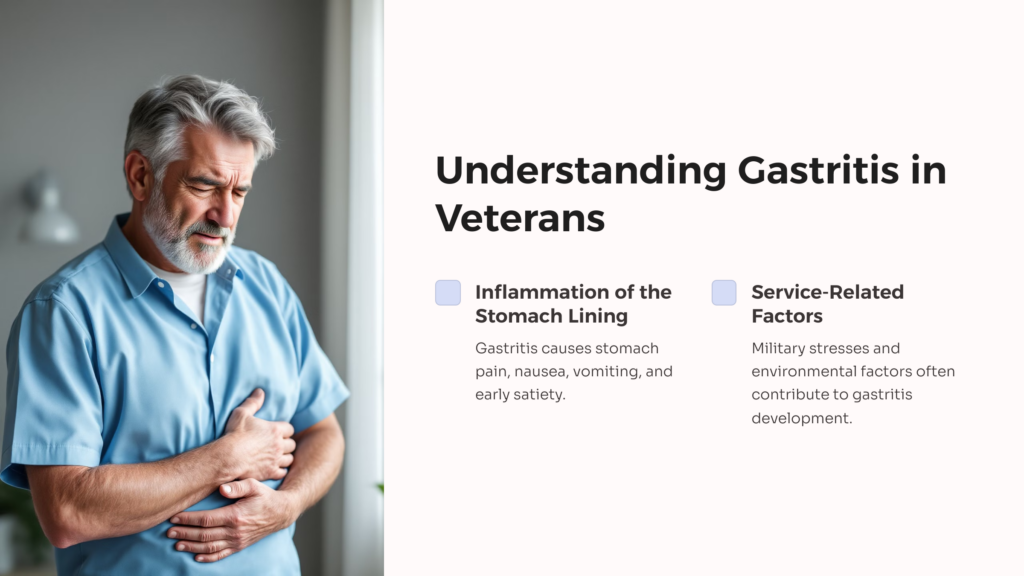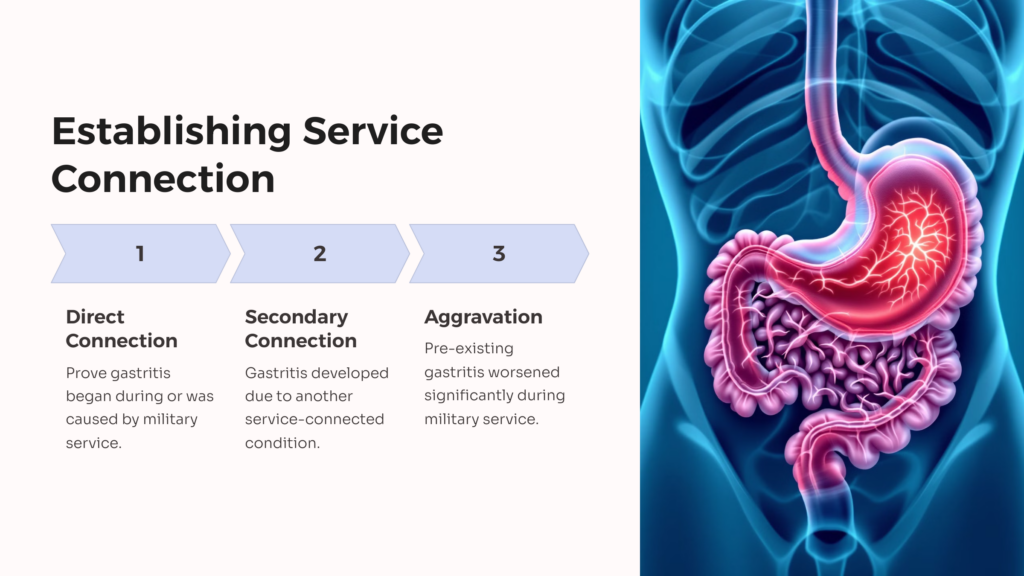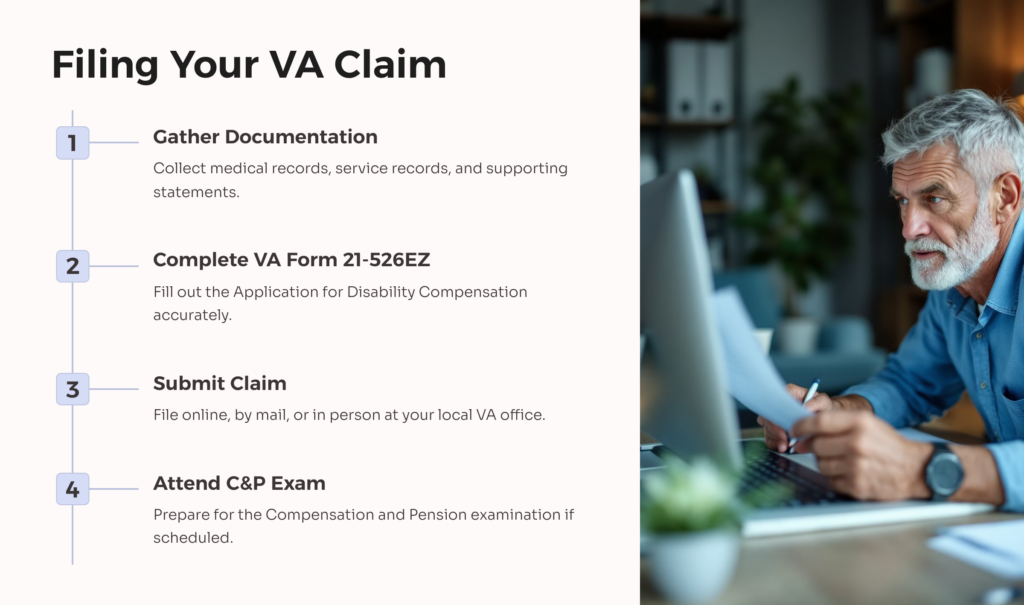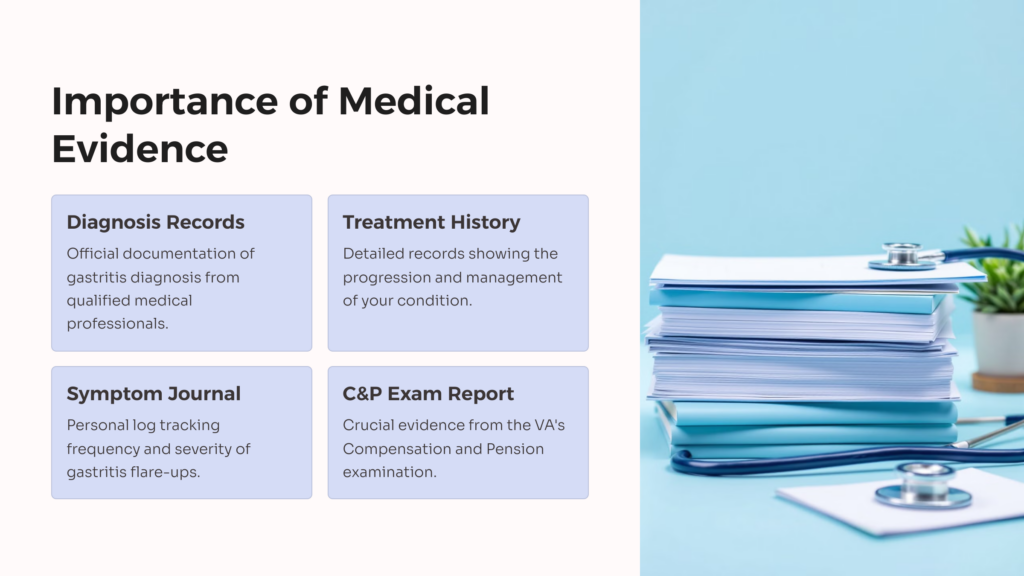
Gastritis is a condition that affects many veterans, causing inflammation of the stomach lining. For those who have served in the military, this condition can be particularly troublesome, often stemming from the stresses and environmental factors encountered during service. Veterans experiencing gastritis may suffer from symptoms such as stomach pain, nausea, vomiting, and a feeling of fullness after eating only small amounts of food.
The impact of gastritis on veterans can be significant, affecting their daily lives and ability to work. Many find themselves struggling with chronic discomfort and dietary restrictions, which can lead to a decreased quality of life. It’s crucial for veterans to understand that if their gastritis is service-connected, they may be eligible for VA disability benefits.
Recognizing the signs of gastritis is the first step in seeking proper care and support. Veterans who experience persistent stomach issues, especially those that worsen over time, should consult with their healthcare providers. Early diagnosis and treatment can help manage symptoms and prevent more serious complications.
The VA Rating System for Gastritis
The Department of Veterans Affairs (VA) uses a specific rating system to evaluate the severity of gastritis in veterans. This system is designed to assess how much the condition impacts a veteran’s daily life and ability to work. Understanding this rating system is crucial for veterans seeking compensation for their gastritis.
As of May 19, 2024, the VA rates gastritis under the diagnostic code for peptic ulcer disease (7304). The ratings range from 0% to 100%, with intermediate ratings at 20%, 40%, and 60%. The rating assigned depends on the frequency and severity of symptoms, as well as their impact on the veteran’s health and daily functioning.
For example, a 20% rating might be given if a veteran experiences episodes of abdominal pain, nausea, or vomiting that last for at least three consecutive days, occur three times or less in the past 12 months, and are managed by daily prescribed medication. Higher ratings are assigned for more frequent and severe symptoms, with the highest ratings reserved for cases involving severe complications or requiring hospitalization.
How to Establish a Service Connection for Gastritis

Establishing a service connection is crucial for veterans seeking VA disability benefits for gastritis. There are three primary ways to establish this connection:
1. Direct Service Connection: This requires proving that your gastritis began during or was caused by your military service. You’ll need to provide medical evidence of a current diagnosis, records of an in-service event or illness that could have caused the gastritis, and a medical opinion linking the two.
2. Secondary Service Connection: If your gastritis developed as a result of another service-connected condition, you may qualify for secondary service connection. For example, if medication for a service-connected mental health condition led to gastritis, you could claim it as secondary.
3. Aggravation of a Pre-existing Condition: If you had gastritis before joining the military, but your service significantly worsened the condition, you may be eligible for benefits based on aggravation.
To successfully establish a service connection, gather all relevant medical records, service records, and any statements from fellow service members or family that can support your claim. A strong case often includes a clear timeline showing the onset or worsening of gastritis symptoms in relation to your military service.
Filing Your VA Claim for Gastritis: Essential Steps

Filing a VA claim for gastritis requires careful preparation and attention to detail. Here are the essential steps to follow:
1. Gather all necessary documentation, including medical records, service records, and any other evidence that supports your claim. This might include statements from fellow service members or family members who can attest to your condition.
2. Complete VA Form 21-526EZ, Application for Disability Compensation and Related Compensation Benefits. Be sure to fill out this form completely and accurately.
3. Submit your claim online through the VA’s eBenefits portal, by mail, or in person at your local VA office. Online submission is often the fastest method.
4. Prepare for a Compensation and Pension (C&P) exam. The VA may schedule this exam to assess the severity of your gastritis and its impact on your daily life.
5. Follow up on your claim regularly. You can check the status online or by contacting the VA directly.
Remember, the key to a successful claim is providing comprehensive evidence that clearly demonstrates the service connection and severity of your gastritis. Don’t hesitate to seek assistance from a Veterans Service Organization or a VA-accredited claims agent if you need help navigating the process.
Common Mistakes to Avoid When Filing a Claim
When filing a VA claim for gastritis, veterans should be aware of common pitfalls that can delay or negatively impact their claim. One frequent mistake is failing to provide sufficient medical evidence. It’s crucial to include detailed medical records that clearly show a diagnosis of gastritis and its connection to your military service.
Another error is overlooking the importance of the nexus letter. This document, written by a medical professional, explains how your gastritis is linked to your military service. Without a strong nexus letter, your claim may be denied. Additionally, some veterans make the mistake of downplaying their symptoms during their C&P exam. It’s important to be honest and thorough about how gastritis affects your daily life.
Timing can also be an issue. Waiting too long to file a claim can make it harder to establish a service connection. If you’re experiencing symptoms of gastritis, it’s best to seek medical attention and file a claim as soon as possible. Lastly, not following up on your claim or missing scheduled appointments can lead to delays or denials. Stay proactive throughout the claims process to ensure the best possible outcome.
The Role of Medical Evidence in Gastritis Claims

Medical evidence plays a crucial role in supporting your VA claim for gastritis. This evidence serves as the foundation for establishing both the existence of your condition and its connection to your military service. The stronger and more comprehensive your medical evidence, the better your chances of receiving an appropriate VA rating for gastritis.
Key pieces of medical evidence include:
- Diagnosis records from a qualified medical professional
- Treatment records showing the progression and management of your gastritis
- Lab results or imaging studies that confirm the presence of gastritis
- Statements from your healthcare providers about the severity and impact of your condition
It’s important to ensure that your medical records clearly document the frequency and severity of your symptoms. This information directly influences your VA rating. If possible, keep a symptom journal to track your gastritis flare-ups and their impact on your daily activities. This can provide valuable supporting evidence for your claim.
Remember, the VA will also consider evidence from your C&P exam. During this exam, be honest and thorough about your symptoms and how they affect your life. The examiner’s report will be a key piece of evidence in determining your rating.
How Symptoms Affect Your Gastritis VA Rating
The severity and frequency of your gastritis symptoms play a significant role in determining your VA disability rating. Understanding how different symptoms are evaluated can help you better communicate your condition to healthcare providers and VA examiners.
Common symptoms that affect your rating include:
- Abdominal pain
- Nausea and vomiting
- Changes in appetite and weight
- Bloating and indigestion
- Blood in stool or vomit (in severe cases)
The VA considers not only the presence of these symptoms but also their impact on your daily life and ability to work. For example, if your gastritis causes frequent episodes of vomiting that interfere with your ability to maintain employment, this could warrant a higher rating.
It’s important to document how often you experience symptoms and how they affect your activities. Keep track of any missed work days, dietary restrictions, or limitations on physical activities due to your gastritis. This information can be crucial in demonstrating the full impact of your condition and securing an appropriate VA rating.
Exploring Higher Ratings and TDIU for Severe Cases
For veterans with severe gastritis that significantly impacts their ability to work, exploring higher ratings or Total Disability Individual Unemployability (TDIU) may be necessary. Higher ratings (60% or 100%) are reserved for cases where gastritis causes severe health complications or requires frequent hospitalizations.
TDIU is an option for veterans who are unable to maintain substantially gainful employment due to their service-connected conditions. If your gastritis, alone or in combination with other service-connected disabilities, prevents you from working, you may be eligible for TDIU. This benefit allows you to receive compensation at the 100% rate, even if your combined disability rating is less than 100%.
To be considered for TDIU, you typically need:
- One service-connected disability rated at 60% or more, OR
- Two or more service-connected disabilities with at least one rated at 40% or more and a combined rating of 70% or more
If you believe your gastritis severely impacts your employability, discuss the possibility of TDIU with your healthcare provider or a VA-accredited claims agent. They can help you gather the necessary evidence to support a TDIU claim.
Appealing a Denied Gastritis VA Rating
If your claim for a gastritis VA rating is denied or you receive a lower rating than expected, don’t lose hope. You have the right to appeal the decision. The appeals process provides an opportunity to present additional evidence and argue for a higher rating.
Here are the steps to appeal a VA decision:
1. Review the decision letter carefully to understand why your claim was denied or why you received a lower rating.
2. Gather any new evidence that addresses the reasons for denial or supports a higher rating.
3. File a Notice of Disagreement (NOD) within one year of the decision date.
4. Consider requesting a Decision Review Officer (DRO) review, which allows for a fresh look at your claim.
5. If you’re still unsatisfied after the DRO review, you can appeal to the Board of Veterans’ Appeals.
Remember, the appeals process can be complex and time-consuming. It’s often beneficial to seek assistance from a Veterans Service Organization or a VA-accredited attorney who specializes in veterans’ law. They can help you navigate the process and present the strongest possible case for your appeal.
Frequently Asked Questions About Gastritis VA Ratings
Veterans often have questions about gastritis VA ratings. Here are answers to some common queries:
Q: Can I receive VA disability for gastritis even if I was diagnosed after leaving the military?
A: Yes, if you can establish a service connection by showing that your gastritis is related to your military service.
Q: How often does the VA reevaluate gastritis ratings?
A: The VA may schedule routine future examinations to assess the current severity of your condition. The frequency depends on the nature and stability of your gastritis.
Q: Can my gastritis rating be reduced?
A: Yes, if the VA determines that your condition has improved. However, they must provide clear evidence of sustained improvement before reducing your rating.
Q: Is gastritis considered a presumptive condition for any group of veterans?
A: Gastritis itself is not a presumptive condition, but it may be secondary to other presumptive conditions related to specific types of service or exposure.
Q: Can I work and still receive VA disability for gastritis?
A: Yes, you can work and receive VA disability benefits for gastritis, unless you’re receiving TDIU benefits.
Remember, each case is unique, and these answers may not apply to every situation. Always consult with a VA representative or healthcare provider for advice specific to your circumstances.
Expert Tips for Navigating the VA Claims Process
Navigating the VA claims process for gastritis can be challenging, but these expert tips can help streamline your journey:
1. Be thorough and honest when describing your symptoms. Provide specific examples of how gastritis affects your daily life and work.
2. Keep a detailed symptom journal. This can provide valuable evidence of the frequency and severity of your gastritis flare-ups.
3. Don’t miss VA appointments or deadlines. Set reminders for important dates related to your claim.
4. Consider getting a buddy statement from someone who can attest to how your gastritis has affected you since your military service.
5. If you’re unsure about any part of the process, don’t hesitate to ask for help. VA representatives, Veterans Service Organizations, and accredited claims agents are available to assist you.
6. Stay informed about changes in VA regulations that might affect your claim. The VA occasionally updates its rating criteria and procedures.
7. Be patient but persistent. The claims process can take time, but regular follow-ups can help keep your claim moving forward.
By following these tips and staying proactive throughout the claims process, you can improve your chances of receiving an appropriate VA rating for your gastritis. Remember, you’ve earned these benefits through your service, and it’s important to advocate for the support you deserve.
 AllVeteran.com Advisors
AllVeteran.com Advisors
With expertise spanning local, state, and federal benefit programs, our team is dedicated to guiding individuals towards the perfect program tailored to their unique circumstances.











